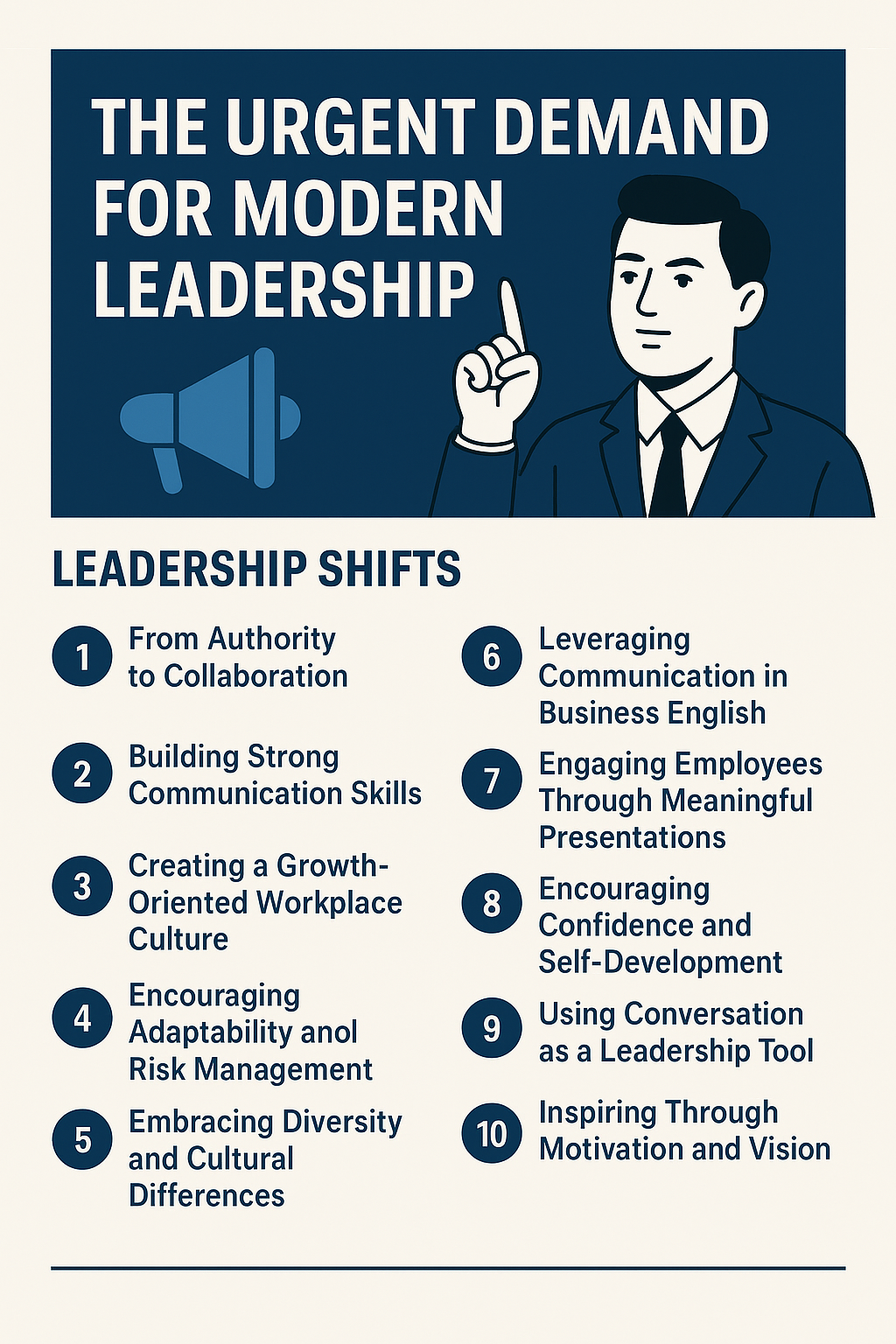Essential Leadership Shifts Every Organization Must Adopt Immediately
The Urgent Demand for Modern Leadership
Leadership in today’s fast-paced business world is no longer about maintaining the status quo. The workplace is evolving quickly, driven by technology, globalization, and shifting employee expectations. Companies that fail to adapt risk falling behind competitors who embrace innovation and agility. Every organization must recognize that leadership is not just a title—it’s a set of skills and strategies that keep teams aligned and motivated.
As industries grow more competitive, a strong business speaker can provide direction and clarity to leaders who feel overwhelmed. Engaging with keynote speakers and motivational speakers ensures that organizations gain valuable insights to meet urgent demands. These leadership shifts are not optional—they are critical for survival and growth.
Leadership Shift #1: From Authority to Collaboration
Emphasizing Mutual Understanding
Gone are the days when leaders relied solely on authority to manage employees. The modern organization thrives on collaboration, where every team member feels empowered to contribute ideas. Leaders must communicate clearly, foster mutual understanding, and listen to their employees.
By shifting toward collaboration, leaders improve workplace culture and strengthen trust within teams. For co workers, collaboration transforms projects from isolated tasks into opportunities for shared success. When leaders adapt in this way, the audience engaged during company meetings is not just listening—they are actively contributing.
Leadership Shift #2: Building Strong Communication Skills
The Role of Communication Strategy
Effective leadership depends on clear and consistent communication. In modern business, poor communication leads to mistakes, missed opportunities, and loss of customers. Leaders must adopt a deliberate communication strategy that ensures messages are understood.
Developing strong communication skills helps leaders become more than managers—they become mentors who inspire their teams. Whether in a job interview, during internal meetings, or in business conversations, leaders must communicate to ensure the audience understand the message. Using conversation topics relevant to current events can keep meetings fresh and impactful.
Leadership Shift #3: Creating a Growth-Oriented Workplace Culture
Investing in Professional Development
An organization that neglects growth will eventually face decline. Leaders must prioritize professional development by giving employees the tools to enhance their skills and pursue a rewarding career path.
- Provide training through workshops or business english class settings.
- Encourage students talking and students work scenarios for role-play in meetings.
- Allow employees to practice small talk, build confidence, and refine communication skills.
These initiatives prepare employees for leadership roles themselves, ensuring that future leaders emerge within the corporate culture.
Leadership Shift #4: Encouraging Adaptability and Risk Management
Preparing for Future Trends
Modern businesses face constant challenges. Leaders must encourage adaptability by teaching teams how to prepare for future trends. This includes understanding marketing strategies, embracing technology, and practicing sound risk management.
Companies that adapt quickly gain an edge in sales and attract more customers. Leaders who stay flexible not only protect their organizations but also create new opportunities in the marketplace. This proactive approach turns uncertainty into a competitive advantage.
Leadership Shift #5: Embracing Diversity and Cultural Differences
Building Inclusive Organizations
Strong leadership requires awareness of cultural differences and the ability to create inclusive spaces where students feel welcome. Leaders must also understand the impact of international conference opportunities and how exposure to global markets enriches organizational knowledge.
By embracing diversity, leaders develop strategies that promote fairness, empathy, and self esteem among employees. Inclusivity doesn’t just improve workplace culture—it strengthens the company as a whole.
Leadership Shift #6: Leveraging Communication in Business English
Helping Employees Gain Confidence
Clear business english and effective business communication are essential in global markets. Many leaders overlook the importance of business english students and esl students who may struggle with conversation topics or phrasal verbs. Supporting employees through training helps them gain confidence, whether during a job interview, in business conversations, or when presenting to audience understand expectations.
Leaders who help employees master business english create stronger communication channels and foster more engaging interactions across the business world.
Leadership Shift #7: Engaging Employees Through Meaningful Presentations
Keeping the Audience Engaged
Modern leaders must be skilled in presentation delivery. Whether addressing an audience of employees, small businesses, or at an international conference, leaders must use clear communication and eye contact to keep the audience engaged.
Strong presentations do more than convey information. They create energy, inspire action, and ensure that the audience understand both the message and the urgency behind it. This ability positions leaders as effective communicators capable of driving real change.
Leadership Shift #8: Encouraging Confidence and Self-Development
Building Self Esteem in the Workplace
Confidence is contagious in the workplace. Leaders who help employees gain confidence improve not only individual performance but also team productivity. Supporting employees in building self esteem ensures that each person feels valued and respected.
Through targeted mentoring, leaders can help employees navigate their career, pursue a dream job, and stay on a positive career path. By setting example after example, leaders show employees what’s possible and motivate them to create their own success stories.
Leadership Shift #9: Using Conversation as a Leadership Tool
Expanding Communication Beyond Small Talk
Strong leaders know that meaningful conversation drives organization success. While small talk has its place in networking and team-building, leaders must master conversation topics that encourage problem-solving, innovation, and collaboration.
Encouraging employees to participate in role-play or class exercises can simulate real-world conversation challenges. This practice helps students and employees alike to communicate more effectively, improve skills, and become comfortable handling various conversation topics in the business world.
Leadership Shift #10: Inspiring Through Motivation and Vision
Bringing Audiences Together
Every great speaker understands the power of vision. Leaders must inspire their audience by connecting daily tasks to long-term company goals. This requires using motivational speakers or keynote speakers to show leaders the art of engaging communication.
By motivating employees, leaders ensure that students, employees, and customers stay aligned with the organization’s mission. The benefits include higher morale, stronger loyalty, and increased sales.
Moving Forward with Leadership Transformation
Adopting these leadership shifts requires focus, training, and the willingness to challenge outdated methods. Leaders who embrace collaboration, build communication skills, and encourage inclusivity will see dramatic improvements in workplace efficiency. Organizations that remain rigid risk losing talented employees, missing out on marketing opportunities, and failing to adapt to current affairs.
Investing in leadership transformation is not optional—it’s the lifeline that ensures your company thrives in today’s world.

How Andrew Rhoden Can Help Your Company Address Current Business Trends
Andrew Rhoden, Esq., stands apart as a premier business speaker with deep expertise in law, business strategy, and leadership. His ability to keep an audience engaged through dynamic storytelling ensures that leaders walk away with actionable strategies. From business english applications to mastering communication in diverse settings, Andrew’s presentations provide companies with the tools needed to adapt quickly.
Andrew’s sessions cover current events, future trends, and emerging leadership practices that prepare organizations for challenges ahead. Whether addressing small businesses, corporations, or associations, he tailors each presentation to ensure the audience understand the urgency of adopting these leadership shifts.
Learning from Business Speakers and Keynote Experts
In today’s competitive environment, organizations cannot afford to overlook the influence of a seasoned business speaker. By bringing in professionals such as keynote speakers and motivational speakers, companies gain immediate access to strategies that accelerate leadership growth. These experts provide fresh perspectives on handling modern challenges, keeping teams focused, and ensuring that leaders are prepared to guide employees through uncertainty. Partnering with a dynamic speaker is not just about inspiration—it is about equipping organizations with practical tools that transform leadership effectiveness and drive long-term success.
Take Action Today
The time to act is now. Every day an organization delays implementing these leadership shifts, opportunities are lost and risks increase. Andrew Rhoden’s engaging approach equips companies with practical strategies to strengthen their leadership and achieve measurable results.
Contact us today at (888) 209-4055 for a free consultation. Let’s discuss how Andrew can help your company not only adapt to today’s demands but also prepare for the challenges and opportunities of tomorrow. Don’t wait—book Andrew Rhoden now and elevate your next event with expert business speaking services that transform leaders and inspire lasting success.
share this
Related Articles
Related Articles
STAY UP TO DATE
GET PATH'S LATEST
Receive bi-weekly updates from the church, and get a heads up on upcoming events.
Contact Us












